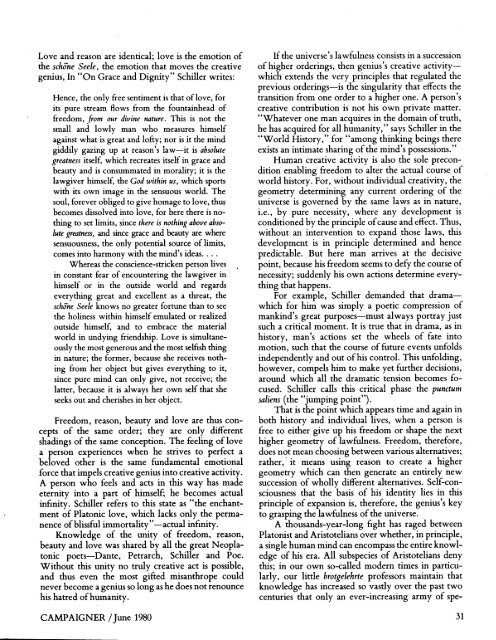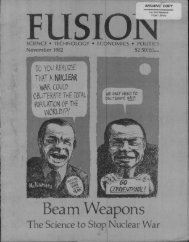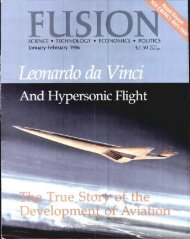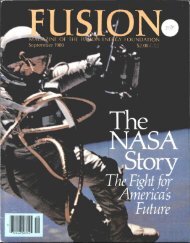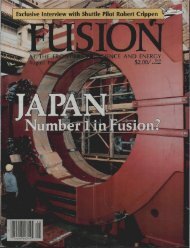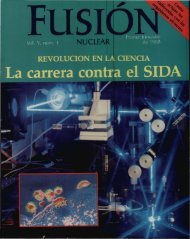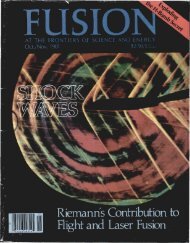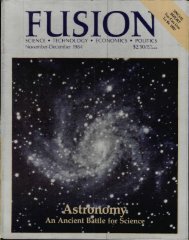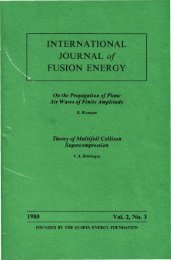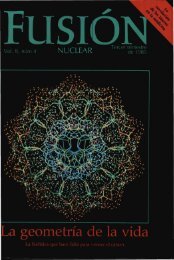Campaigner
Campaigner
Campaigner
Create successful ePaper yourself
Turn your PDF publications into a flip-book with our unique Google optimized e-Paper software.
Love and reason are identical; love is the emotion of If the universe's lawfulness consists in a succession<br />
the schb'neSeele, the emotion that moves the creative of higher orderings, then genius's creative activity--<br />
genius, In "On Grace and Dignity" Schiller writes: which extends the very principles that regulated the<br />
previous orderings is the singularity that effects the<br />
Hence, the only free sentiment is that of love, for transition from one order to a higher one. A person's<br />
its pure stream flows from the fountainhead of creative contribution is not his own private matter.<br />
freedom, from our divine nature. This is not the "Whatever one man acquires in the domain of truth,<br />
small and lowly man who measures himself he has acquired for all humanity," says Schiller in the<br />
against what is great and lofty; nor is it the mind "World History," for "among thinking beings there<br />
giddily gazing up at reason's taw--it is absolute exists an intimate sharing of the mind's possessions."<br />
greatnessitself, which recreates itself in grace and Human creative activity is also the sole preconbeauty<br />
and is consummated in morality; it is the dition enabling freedom to alter the actual course of<br />
lawgiver himself, the God within us, which sports world history. For, without individual creativity, the<br />
with its own image in the sensuous world. The geometry determining any current ordering of the<br />
soul, forever obliged to give homage to love, thus universe is governed by the same laws as in nature,<br />
becomes dissolved into love, for here there is no- i.e., by pure necessity, where any development is<br />
thing to set limits, since thereis nothingaboveabso- conditioned by the principle of cause and effect. Thus,<br />
lutegreatness,and sincegrace and beauty are where without an intervention to expand _those laws, this<br />
sensuousness,the only potential source of limits, development is in principle determined and hence<br />
comes into harmony with the mind's ideas.... predictable. But here man arrives at the decisive<br />
Whereas the conscience-stricken person lives point, because his freedom seems to defy the course of<br />
in constant fear of encountering the lawgiver in necessity; suddenly his own actions determine everyhimself<br />
or in the outside world and regards thing that happens.<br />
everything great and excellent as a threat, the For example, Schiller demanded that drama--<br />
schb'neSeele knows no greater fortune than to see which for him was simply a poetic compression of<br />
the holiness within himself emulated or realized mankind's great purposes--must always portray just<br />
outside himself, and to embrace the material such a critical moment. It is true that in drama, as in<br />
world in undying friendship. Love is simultane- history, man's actions set the wheels of fate into<br />
ously the most generous and the most selfishthing motion, such that the course of future events unfolds<br />
in nature; the former, because she receives noth- independently and out of his control. This unfolding,<br />
ing from her object but gives everything to it, however, compels him to make yet further decisions,<br />
since pure mind can only give, not receive; the around which all the dramatic tension becomes folatter,<br />
because it is always her own self that she cused. Schiller calls this critical phase the punctum<br />
seeksout and cherishesin her object, saliens (the "jumping point").<br />
That is the point which appears time and again in<br />
Freedom, reason, beauty and love are thus con- both history and individual lives, when a person is<br />
cepts of the same order; they are only different free to either give up his freedom or shape the next<br />
shadings of the same conception. The feeling of love higher geometry of lawfulness. Freedom, therefore,<br />
a person experiences when he strives to perfect a does not mean choosing between various alternatives;<br />
beloved other is the same fundamental emotional rather," it means using reason to create a higher<br />
force that impels creative genius into creative activity, geometry which can then generate an entirely new<br />
A person who feels and acts in this way has made succession of wholly different alternatives. Self-coneternity<br />
into a part of himself; he becomes actual sciousness that the basis of his identity lies in this<br />
infinity. Schiller refers to this state as "the enchant- principle of expansion is, therefore, the genius's key<br />
ment of Platonic love, which lacks only the perma- to grasping the lawfulness of the universe.<br />
nence of blissful immortality" actual infinity. A thousands-year-long fight has raged between<br />
Knowledge of the unity of freedom, reason, Platonist and Aristotelians over whether, in principle,<br />
beauty and love was shared by all the great Neopla- a single human mind can encompass the entire knowltonic<br />
poets Dante, Petrarch, Schiller and Poe. edge of his era. All subspecies of Aristotelians deny<br />
Without this unity no truly creative act is possible, this; in our own so-called modern times in particuand<br />
thus even the most gifted misanthrope could larly, our little brotgelehrte professors maintain that<br />
never become a genius so long as he does not renounce knowledge has increased so vastly over the past two<br />
his hatred of humanity, centuries that only an ever-increasing army of spe-<br />
CAMPAIGNER/June 1980 31


